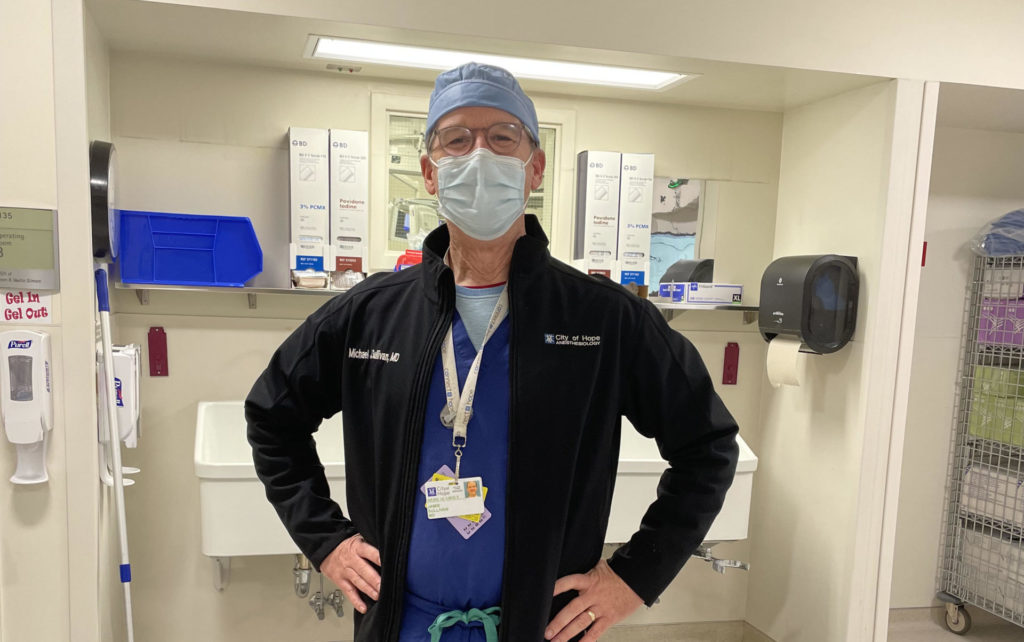Dr. Michael James Sullivan is chair of the Department of Anesthesiology and Perioperative Medicine at the City of Hope National Medical Center in Duarte.
He’s also a friend who reminds me why we often consider a physician the next best thing to a priest.
Dr. Sullivan’s grandfather, father, and uncle were all physicians. He was born at the old San Bernardino County Hospital where his father was doing a residency.
His mother lost four other pregnancies. “Now the babies would have been premature and we probably would have saved them. That kind of cast a shadow. My parents healed from it, and went on to adopt two daughters, my sisters. But I always felt I had a purpose. Don’t get me wrong; we’re all special. But some specific duty to fulfill.”
His route to anesthesiology was circuitous. From the beginning he wanted to follow in the footsteps of his father and grandfather: old-school GPs (general practitioners) who were on call 24/7. “They did everything: surgery, OB, pediatrics. My grandfather had delivered kids who went on to become my father’s patients.”
He attended Catholic grade school, high school, and college (LMU). “When I got into med school (Creighton, also Catholic, in Omaha, Nebraska), my mother said, ‘Now the gates of hell have opened for you.’ Jokingly, but she knew the lifestyle.”
Things were changing, however. The GP had become the family practitioner. With a great desire to serve the marginalized and underprivileged he ended up doing his residency at Martin Luther King Jr. Community Hospital in South LA: three years in emergency medicine.
While at MLK he met a visiting nurse named Maura. They soon married, and served a year abroad practicing medicine in a little farm community in the mountains of the Dominican Republic “This was 1994-95. No TV, no electricity. A lot of time for introspection.”
He started asking himself what he really liked about the ER. “I liked the trauma and the resuscitation: trying to stop the downward spiral, reverse the damage and stabilize. MLK was great for all that: knives, guns, ODs. That first hour of airway management, placing lines for blood, fluids, and medicines is all anesthesia. And I realized I should really develop a specialized skill set.”
So he went from making $144,000 a year to $22,000, became a student again, and served a second three-year residency, this time at USC.
(Maura meanwhile went on to earn a master’s in Nursing, and a Ph.D. in Educational Psychology and is now USC’s vice chair of Educational Affairs in the Department of Surgery).
For years he happily did full-time anesthesiology at USC and moonlit there and at Queen of the Valley Hospital in West Covina in ER: (“I liked that it was a Marian-named institution”). He loved the pace, loved the work.
But one day an old colleague called looking for a recommendation for a staff anesthesiologist at City of Hope National Medical Center. “And out of the blue, I said, ‘Can I have the job?’ ”
The mission of City of Hope is cancer, very different from the trauma and ER work he was used to. “City of Hope is any kind of cancer, any kind of patient, any age. The care is more one-to-one, much of it palliative. Many patients don’t return to their former way of life.”
He grew to love his work there, too. He’d always had deep affection for his patients and their families.
If he could give one piece of advice to any physician, it would be to develop the skill of “empathetic listening.” “You want to cultivate a good therapeutic relationship with everyone involved: patient, family members, colleagues, nurses, techs.”
Almost 20 years passed. He tried to be a “good citizen” at work, organizing lectures, celebrating milestones. His and Maura’s two kids, a son and a daughter, were growing up.
Then around 2017, he felt a mysterious call to pray the rosary daily. Six weeks later the chairmanship of Anesthesiology job, again seemingly out of the blue, dropped in his lap.
“Going from a staff anesthesiologist to chair was pretty sudden. But I attribute it all to Mary, and it goes back to being selected. I had to believe that I’d be given the graces to step up to the plate and serve.”
He now oversees a department of 19 anesthesiologists and an overall staff of around 60. “And we’re growing. City of Hope when I started was a regional, boutique hospital. Now we’re a national footprint with 11,000 employees, 26 satellite clinics, and a full campus in Orange County.”
His goal is to be a servant-leader. “Everything I’ve given to my patients, I now give to the department. If I make everyone in my department successful, I’m successful.”
He jokes, “I’m able to combine anesthesiology with theology. I like to point to the Scripture passage where God put Adam asleep to make Eve. God chose at one point in time to be an anesthesiologist. So we have big shoes to fill.”
He rises each morning at 5:30 to drive from Pasadena to Duarte. His hours, after all, are a physician’s hours and they leave little time for travel or rest. But Dr. Sullivan, who just turned 60, wouldn’t have it any other way.
“If Mary decided tomorrow I’m done, I’d be fine. But this gift I’ve been given, I’ll keep going till it’s time not to.”

